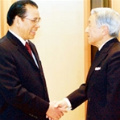No Time For Rest – Emperor Akihito’s Busy Schedule
The Imperial Household Agency disclosed recently that it intends to lessen the burden on Emperor Akihito of Japan by reducing his duties throughout the year. Last December, the emperor was diagnosed with arrhythmia, or irregular heartbeat, and inflammation in his stomach and duodenum. His condition was said to be caused by stress, and in the following days, several of the emperor’s engagements had to be cancelled, for instance, his annual news conference, customarily held prior to his Dec. 23 birthday. The emperor soon resumed his duties, but the Imperial Household Agency announced in February that it intended to reduce his workload throughout the year. Still, it might fairly be doubted how much of this announcement was owing to wishful thinking on the part of the Imperial Household members. There were rumours leaked that say that there has been a “tug of war” ongoing between the emperor–who regards his duties as important–and agency officials, who wanted to lighten his workload out of concerns for his health.
In any case, taking a look at the emperor’s activities during the last days, one might easily receive the impression that there has someone been defeated in this “war” – and that it has not been His Majesty: After his return from a few days holiday with Prince Akishino and his family at the imperial farm in Tochigi (the empress had not been able to accompany him, owing to a ligament injury in her left knee), the emperor held a press conference on occasion of the imperial wedding anniversary. He underwent all the festivities that were scheduled to mark the imperial couple’s golden wedding anniversary on April 10, including the evening party, a private family dinner, visits with government officials and a tea party at the imperial palace, hosting 101 couples who were also celebrating their golden anniversaries this year.
On April 14, he met with Jordan’s King Abdullah II (Photo1), on April 15, he visited, along with the empress, a photo exhibition, put up on occasion of the couple’s wedding anniversary at a department store in Tokyo, on April 16 he welcomed guests during the annual spring garden party at the Akasaka Imperial Garden in Tokyo (Photo2). On April 17 he not only attended, along with his family, a concert of traditional Japanese ‘gagaku’ court music to celebrate the wedding anniversary as well as the 20th anniversary of the imperial couple’s accession to the Japanese throne, he also met with Pakistani President Asif Ali Zardari at the Imperial Palace in Tokyo (Photo3). On April 18 and 19, he seems to have had two days off. But as April 18 is the birthday of his only daughter, it is to be supposed that he attended her birthday party. Although this certainly was a private, joyous occasion, anybody who has relatives at the emperor’s age (75), might know, that, for them, also a private and joyful event can turn out to be pretty exhausting. Not to mention the fact that, besides his official duties, the emperor has to attend various Shinto rituals at the Imperial Palace. As these are considered private affairs of the imperial family, they are hardly ever mentioned in the press, but they are still considerably adding to the emperor’s workload. (As part of the intended changes in the emperor’s schedule it was announced that he would “spend less time in a midnight Niinamesai ritual.” Those who are not familiar with the details of Shinto rituals will hardly feel reassured by the prospect of a man who would be past retirement age in any other kind of job to be still attending rituals in the middle of the night. That he would, in future, spend less time doing that than he had before would, to an unprejudiced watcher, hardly improve matters.)

Click here to read an article about the meeting of the emperor with Vietnam´s Party General Secretary
And, anyway, as if to make up for the two days off, the emperor attended on Monday, April 20, not only a reception in Tokyo to commemorate the 50th anniversary of an international exchange project for young people sponsored by the Cabinet Office (Photo4), but he also welcomed Vietnam’s Party General Secretary Nong Duc Manh. The emperor described Nong Duc Manh’s visit to Japan as a significant landmark in relations between the two countries, and he thanked the Vietnamese State and people for the warm welcome given to Crown Prince Naruhito during his visit to Vietnam last February. He accepted Mr Manh’s invitation to visit Vietnam with pleasure and said that the visit would be arranged at an appropriate time.
But however important and beneficial the emperor’s activities may be for his country, it becomes very clear that since Makoto Watanabe – who served as Emperor Akihito’s grand chamberlain for more than 10 years until 2007 – said last year, “There are few days a year that the emperor can call his own and completely take off.”, things have not much changed. People who know the emperor’s character well will probably not be surprised. Watanabe himself admitted: “We suggested so many times that his duties should be lessened, but he would not agree to it.” And Crown Prince Naruhito said on his birthday news conference last February: “I continue to pray from the depths of my heart that His Majesty will take good care of himself… I believe it is important to pay heed to Their Majesties’ health and age in considering their official duties and to avoid excessive burdens on them.” But, knowing his father, he added: “At the same time, those who support His Majesty, including myself, need to give sufficient consideration, respecting the feelings of His Majesty, who sincerely cherishes the duties of Emperor.”
Filed under JapanTagged Emperor Akihito of Japan, Health, Imperial Household Agency.








Leave a Reply